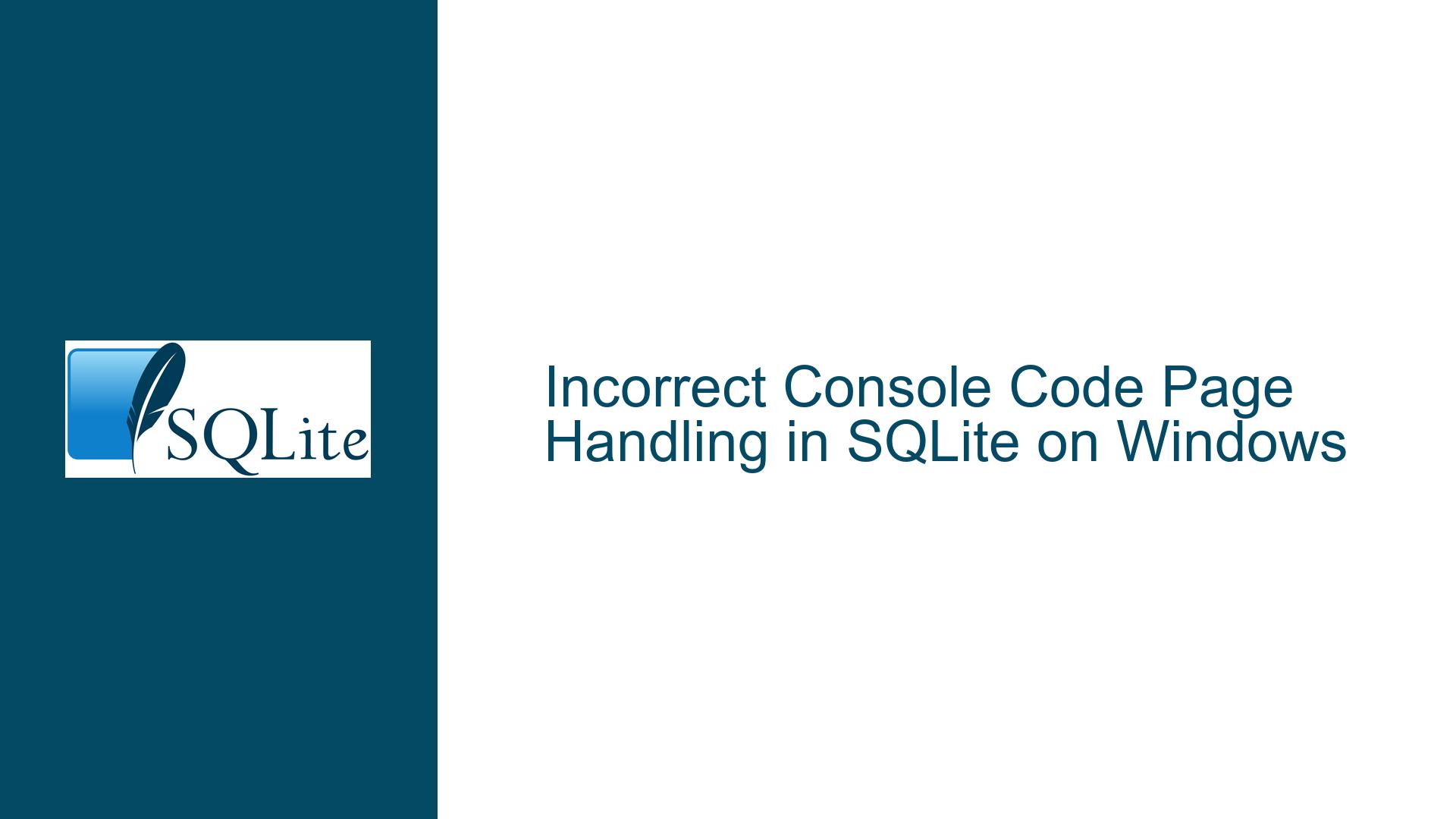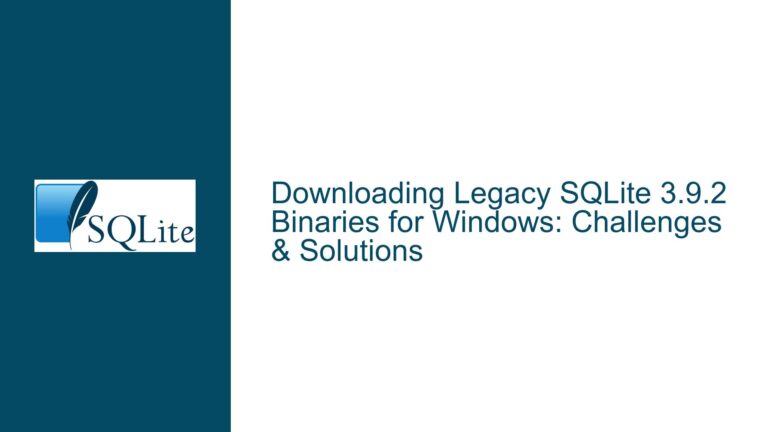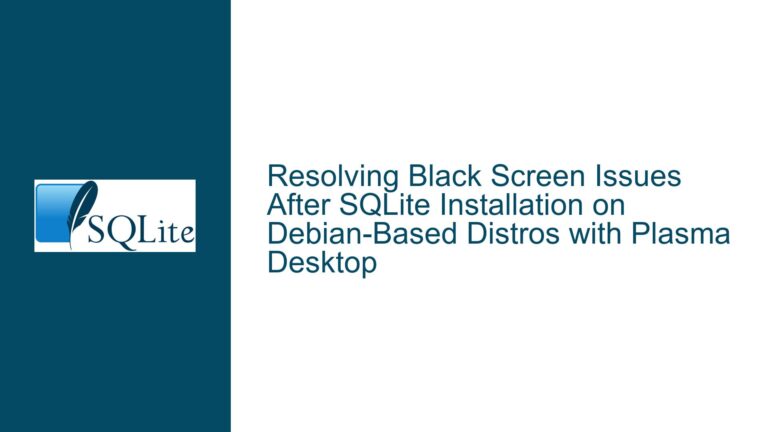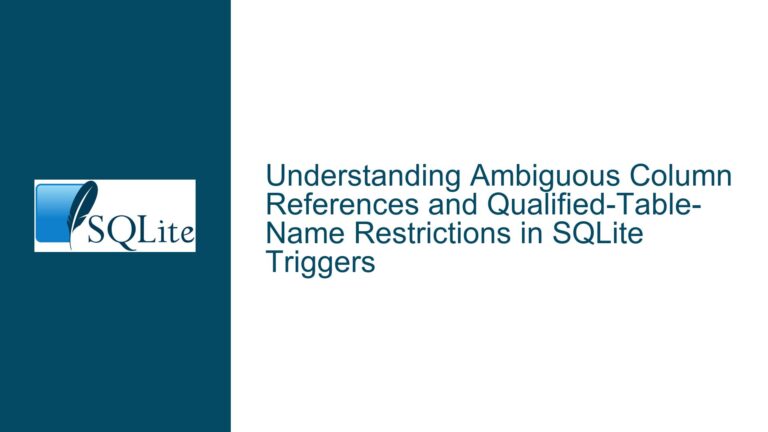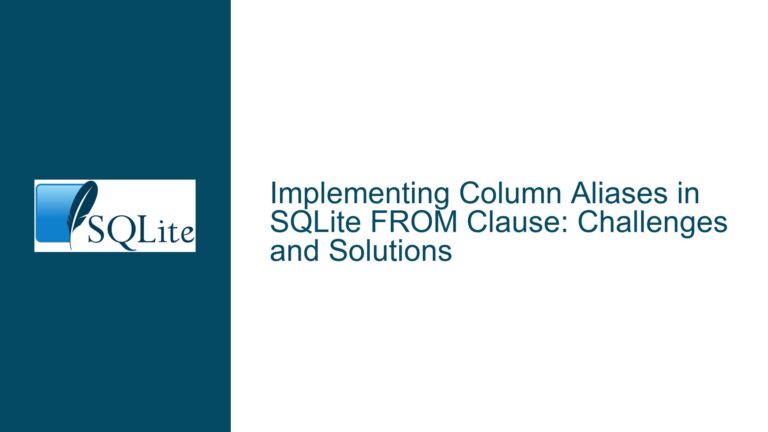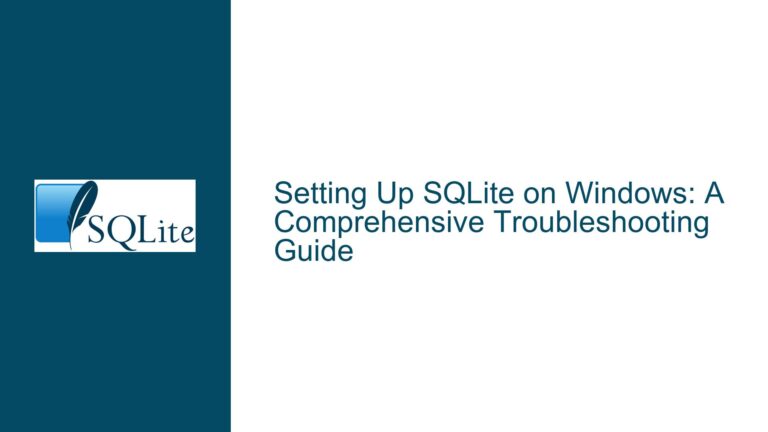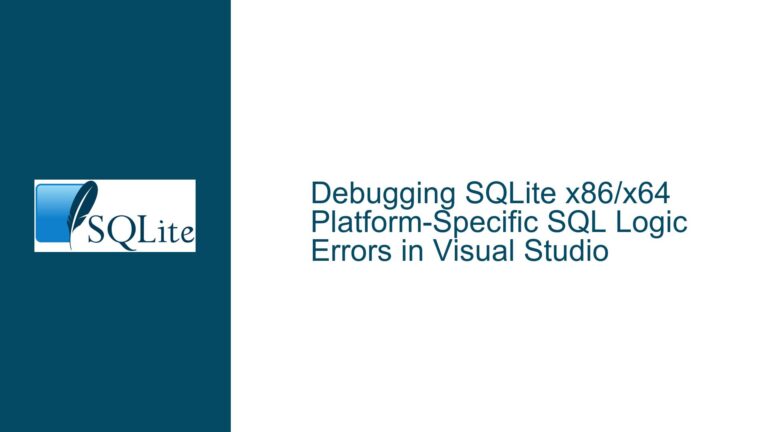Incorrect Console Code Page Handling in SQLite on Windows
Character Encoding Mismanagement Between SQLite and Windows Console
Mismatched Multi-Byte to Unicode Conversions in Windows Console Environments
Issue Overview: Windows Code Page Awareness in Character Conversion Routines
The fundamental challenge stems from SQLite’s Windows console interaction using fixed ANSI/OEM code pages rather than respecting dynamically changing console input/output code pages. When converting between multi-byte character sets (used by Windows consoles) and UTF-8 (SQLite’s internal storage format), the original implementation makes two critical assumptions:
- Static Code Page Selection: Forces choice between CP_ACP (ANSI) and CP_OEMCP (OEM) via boolean flag rather than querying actual console code pages
- Process-Lifetime Persistence: Assumes console code pages never change during application execution
- Shell I/O Coupling: Tightly binds conversion behavior to legacy code page types instead of active console state
This manifests in several concrete failure scenarios:
- Inserted text becomes corrupted when console code page changes mid-session
- Database content display varies based on current console code page
- Cross-code page database portability issues for localized text
- Inconsistent behavior between input entry and output rendering
The Windows console subsystem maintains separate input (GetConsoleCP) and output (GetConsoleOutputCP) code pages that can change dynamically via commands like CHCP. SQLite’s original conversion routines use either the process ANSI code page (CP_ACP) or OEM code page (CP_OEMCP), which don’t track console code page changes.
Character Encoding Pipeline Breakdown Points
Three critical failure domains emerge from this architectural mismatch:
Input Conversion Path
- Console input (via ReadFile) arrives in current input code page
- sqlite3_win32_mbcs_to_utf8_v2 hardcodes CP_OEMCP via useAnsi=0
- Fails to use GetConsoleCP() for accurate input encoding
Output Conversion Path
- UTF-8 to console output requires current output code page
- sqlite3_win32_utf8_to_mbcs_v2 uses CP_OEMCP via useAnsi=0
- Ignores GetConsoleOutputCP() for proper text rendering
State Transition Handling
- No mechanism to detect code page changes between operations
- Cached conversions retain obsolete code page settings
- Mixed-encoding databases produce unrecoverable text corruption
A concrete example demonstrates the failure cascade:
- User sets console to CP852 (Central European)
- Inserts text "zażółć gęślą jaźń" via shell
- Conversion uses CP_OEMCP (assumed 852) → UTF-8 correctly
- User changes to CP1250 (Windows Eastern European)
- Query displays text via CP_OEMCP (still 852) → mismatch
- Actual console now expects 1250 → renders garbage
Diagnosing Multi-Layer Encoding Mismatches
Four key verification steps expose the root cause:
Code Page Correlation Check
- Compare GetConsoleCP()/GetConsoleOutputCP() against CP_ACP/CP_OEMCP
- Use SystemParametersInfo(SPI_GETDEFAULTINPUTLANG) for OEM correlation
Round-Trip Conversion Test
- Convert sample text UTF-8 → console CP → UTF-8
- Verify binary equality after round trip
Dynamic Code Page Change Monitoring
- Hook SetConsoleCP/SetConsoleOutputCP APIs
- Trace code page changes during SQLite operations
Code Path Analysis
- Audit all MBCS/Unicode conversion call sites
- Map useAnsi boolean to actual code pages used
The critical finding reveals that SQLite’s conversion stack lacks binding to the actual console code pages at operation time, instead relying on preset code page types that may not match current console state.
Resolution Strategy: Dynamic Code Page Binding in Conversion Routines
The proposed patch implements three architectural corrections:
Code Page Parameterization
- Introduces winMbcsToUnicode_v2 and winUnicodeToMbcs_v2
- Replaces boolean useAnsi with explicit codepage parameters
- Maintains legacy functions as wrappers for compatibility
Console API Integration
- Modifies shell.c to use GetConsoleCP()/GetConsoleOutputCP()
- Directly passes current code pages to conversion functions
- Example: sqlite3_win32_utf8_to_mbcs_v3(zText, GetConsoleOutputCP())
Separation of Concerns
- Decouples conversion logic from code page selection policy
- Allows different code page sources (console, registry, heuristic)
Implementation specifics show careful consideration of Windows API constraints:
- CP_ACP vs CP_OEMCP vs active console code pages
- Multi-byte to wide char conversion buffer management
- SQLITE_ENABLE_API_ARMOR protection
- Memory lifecycle with sqlite3_free()
- Backward compatibility through _v2/_v3 function variants
Step-by-Step Remediation and Validation Process
Patch Application Verification
- Confirm function signature changes in os_win.c
- Validate added winMbcsToUnicode_v2/winUnicodeToMbcs_v2
- Check shell.c’s updated conversion calls
Runtime Code Page Binding Test
- Use debugger to trace GetConsoleCP() calls
- Verify parameter flow to MultiByteToWideChar()
Round-Trip Encoding Validation
- Create test database with mixed code page inserts
- Cycle console code pages between operations
- Checksum database content after multiple changes
Edge Case Testing
- Invalid code pages (e.g., 0, 65001)
- Surrogate pair handling
- Legacy code page fallbacks
Performance Profiling
- Benchmark conversion overhead with dynamic code pages
- Compare to original static code page approach
- Analyze malloc patterns under code page thrashing
Sustained Encoding Integrity Measures
Post-resolution, implement preventive safeguards:
Console Code Page Monitoring
- Periodically poll GetConsoleCP() during idle
- Warn when code page changes affect existing data
Database Encoding Declaration
- Store active code page metadata in database
- Enable automatic conversion on attachment
Fallback Conversion Strategies
- Attempt multiple code pages on decoding failure
- Maintain OEM/ANSI conversion history
Extended Error Reporting
- Log actual code page used in conversions
- Report encoding mismatches via sqlite3_log()
Alternative Approach Analysis: Direct Unicode Console I/O
While the patch focuses on improving MBCS conversions, alternative solutions exist:
Windows Unicode API Path
- Use WriteConsoleW for direct UTF-16 output
- Bypass code page conversions entirely
- Requires modifying shell’s print functions
UTF-8 Code Page Enablement
- Set console code page to 65001 (UTF-8)
- Requires Windows 10 1903+ for full support
- Still needs fallback for legacy systems
Hybrid Approach
- Detect UTF-8 console capability
- Auto-switch between MBCS and Unicode APIs
- Complex version/feature detection required
The patch’s MBCS improvement path offers several advantages:
- Backwards compatibility with Windows versions
- No requirement for UCRT or specific Windows 10 builds
- Gradual transition path to full Unicode support
However, limitations remain:
- Still subject to code page repertoire restrictions
- Requires active code page tracking overhead
- Doesn’t solve non-console I/O scenarios
Comprehensive Solution Implementation Guide
For developers needing to replicate or extend this fix:
- Core API Modifications
// New conversion functions with explicit code pages
static LPWSTR winMbcsToUnicode_v2(const char *zText, unsigned int codepage) {
// Directly use passed codepage parameter
nByte = MultiByteToWideChar(codepage, ..., zText, ..., NULL, 0);
// ... rest of implementation
}
// Updated public wrapper with dynamic code page
char *sqlite3_win32_utf8_to_mbcs_v3(const char *zText, unsigned int codepage) {
// Pass through to revised implementation
return winUtf8ToMbcs_v2(zText, codepage);
}
- Shell Integration Updates
// In console output path
char *z2 = sqlite3_win32_utf8_to_mbcs_v3(z1, GetConsoleOutputCP());
// In console input path
char *zTrans = sqlite3_win32_mbcs_to_utf8_v3(zLine, GetConsoleCP());
- Build Configuration
- Ensure Windows SDK headers contain GetConsoleCP/GetConsoleOutputCP
- Verify linker references to kernel32.lib
- Update function visibility in sqlite3.h if needed
- Testing Protocol
.changes on
.system chcp 65001
INSERT INTO test VALUES ('你好世界');
.system chcp 1252
SELECT * FROM test; -- Should still render correctly
Post-Resolution Monitoring Techniques
- Diagnostic Queries
-- Check active code pages during operations
SELECT 'Console Input CP: ' || printf('%d', GetConsoleCP()) AS info
UNION ALL
SELECT 'Console Output CP: ' || printf('%d', GetConsoleOutputCP());
- Conversion Audit Trail
// Add debug tracing in conversion wrappers
#ifdef SQLITE_DEBUG
sqlite3DebugPrintf("Converting via codepage %u\n", codepage);
#endif
- Automated Test Harness
# Cycle through common code pages
65001, 1252, 932, 949 | % {
chcp $_
.\sqlite3.exe test.db "INSERT INTO enc_test VALUES ('Sample text $_');"
}
Historical Context and Related Issues
This problem space has several historical antecedents:
Locale vs Console Encoding Split
- Windows separates thread locale (CP_ACP) from console state
- Many applications incorrectly assume correlation
OEM/ANSI Legacy Dichotomy
- CP_OEMCP originates from DOS device drivers
- CP_ACP ties to Win32 GUI applications
- Console apps historically used OEM, creating incompatibility
UTF-8 Adoption Barriers
- Windows Console UTF-8 support (65001) remained buggy for years
- Many applications still rely on legacy code pages
Cross-Platform Encoding Assumptions
- UNIX-style locale handling differs fundamentally
- SQLite’s abstraction layer must bridge these paradigms
Expert Recommendations for Robust Encoding Handling
Adopt Hybrid Conversion Strategy
- Prefer UTF-8 console when available (CP 65001)
- Fall back to dynamic code page tracking
- Maintain OEM/ANSI conversion as last resort
Implement Encoding Metadata Tracking
- Store active code page with text blobs
- Enable automatic re-encoding on code page changes
Enhance SQLite’s Encoding Diagnostic Interface
- Add sqlite3_encoding_status() API
- Report active conversion code pages
- Log encoding errors with code page context
Develop Comprehensive Test Matrix
- Cover all Windows-supported code pages
- Include bidirectional conversion tests
- Validate across locale changes
Conclusion: Toward Robust Windows Console Integration
The presented solution represents a significant improvement in SQLite’s Windows console handling by properly respecting the dynamic nature of console code pages. Developers implementing these changes must consider:
- Proper code page propagation through all conversion layers
- Comprehensive testing across code page transitions
- Performance impacts of frequent code page queries
- Fallback strategies for edge case code pages
Future enhancements could integrate Windows’ newer UTF-8 capabilities while maintaining backward compatibility. The key architectural takeaway is that encoding conversion systems must treat code pages as mutable runtime state rather than fixed configuration parameters.
